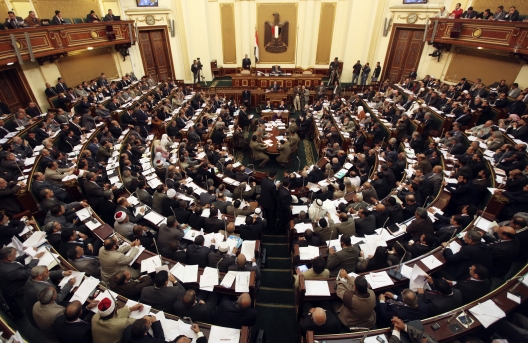 The fate of Egypt’s parliamentary elections once again hangs in the balance following a ruling by the Supreme Constitutional Court (SCC). On March 1, the highest court in Egypt ruled the Parliamentary Constituencies Law unconstitutional. Two days later, the Cairo Administrative Court confirmed the delay in elections, and a committee formed by Prime Minister Ibrahim Mahlab is working on amending the law.
The fate of Egypt’s parliamentary elections once again hangs in the balance following a ruling by the Supreme Constitutional Court (SCC). On March 1, the highest court in Egypt ruled the Parliamentary Constituencies Law unconstitutional. Two days later, the Cairo Administrative Court confirmed the delay in elections, and a committee formed by Prime Minister Ibrahim Mahlab is working on amending the law.
What did the SCC actually say in its ruling?
The SCC rejected appeals filed against the House of Representatives Law and Political Rights Law. It ruled only on the Parliamentary Constituencies Law, saying that Article 3 was unconstitutional. Article 3 determines the number of seats assigned to each electoral district. The SCC’s ruling states that the division of seats discriminates against voters and violates Article 102 of the constitution, which says, “The division of electoral districts are defined by law, taking into account fair representation of population and governorates and equal representation of voters.”
Why are these laws controversial?
The House of Representatives Law & Political Rights Law: Ratified by former interim President Adly Mansour on June 5, 2014.
- The law determines the makeup of the parliament. The 567 members are divided between 420 elected as individual candidates, 120 elected via a list system, and 27 chosen as presidential appointees.
- The 120 members elected via the list system would be chosen based on an absolute majority, meaning only the list that wins the majority in any district will take the seats. This element of the law was the subject of several lawsuits, with many political parties saying it disadvantaged their chances.
- Party lists are limited to only two fifteen seat districts and two forty-five seat districts.
- Party members can run as individual candidates, and individual candidates can run on party lists.
- Parliamentary candidates must hold only the Egyptian citizenship despite the fact that Egyptians living abroad, listed in the quota for party lists, are likely to be dual nationals.
The Parliamentary Constituencies Law: Ratified by President Abdel Fattah al-Sisi on December 22, 2014.
- The 420 individual seats are divided among 231 districts.
- Thirty-five districts are represented by three seats, 119 districts are represented by two seats, and 77 districts are represented by one seat.
- As a result of the divisions, candidates in certain districts would have an unfair advantage, addressing a smaller constituency and conducting an electoral campaign in a smaller geographic area.
- Voters in certain districts are also at an unfair disadvantage with some represented by three members of parliament, and some represented only by one.
When can we expect parliamentary elections to be held?
If amendments to the law are made by April 1, they will then go to the SCC for its review. There is no hard and fast rule on how long the SCC can take to issue its ruling. In this instance, the SCC Commissioner’s Board said on February 21 that the three laws were unconstitutional. The SCC was scheduled to give its final verdict on the laws just over one week later on March 3. It issued its ruling even faster, moving the verdict up to March 1.
If the SCC again takes a minimum of one week to review the law, the application process, together with campaigning, will place the first round of voting as early as May 20. (The application process coupled with, campaigning, and voting, spanned six weeks in the original schedule).
That would place runoffs at least a month later, in late June, coinciding with the beginning of Ramadan. The hot summer months, coupled with Ramadan, make the staging of elections more likely to take place, at the very earliest, in the fall. Some observers, like Ibrahim Eissa, have predicted elections will take place as late as December, 2015. He also adds that there is the possibility that plaintiffs will continue to file lawsuits against the three parliamentary elections laws, which could delay parliamentary elections indefinitely.
Once the law is ready, the HEC has said it will establish a new timetable for elections.
What happens to legislative powers until then?
Legislative power will remain with Sisi, as has been the case since his election. As soon as a parliament is elected, it will be required to review all laws issued by Mansour and Sisi in the space of fifteen, as dictated by Article 156 of the constitution, or they will be retroactively revoked.
Read more in-depth analysis on Egypt’s parliamentary elections laws:
- Egypt’s New Law for Parliamentary Elections Sets Up a Weak Legislature by Nathan J. Brown and Scott Williamson
- The Egyptian Parliament: After a Lengthy Absence, an Uncertain Future by Yussef Auf
- The Egyptian Parliament: Constitutional Short-Comings of the Laws Regulating Elections by Yussef Auf
- The Egyptian Parliament: A Presidential Right to Dissolution by Yussef Auf
Read more on preparations and alliances formed before the SCC ruling:
- Factbox: Gearing up for Egypt’s Parliamentary Elections by EgyptSource
- Who is Participating in Egypt’s Parliamentary Elections? by Nancy Messieh and Ali Mohamed
Image: Photo: Egypt's parliament in 2012 (Reuters)
